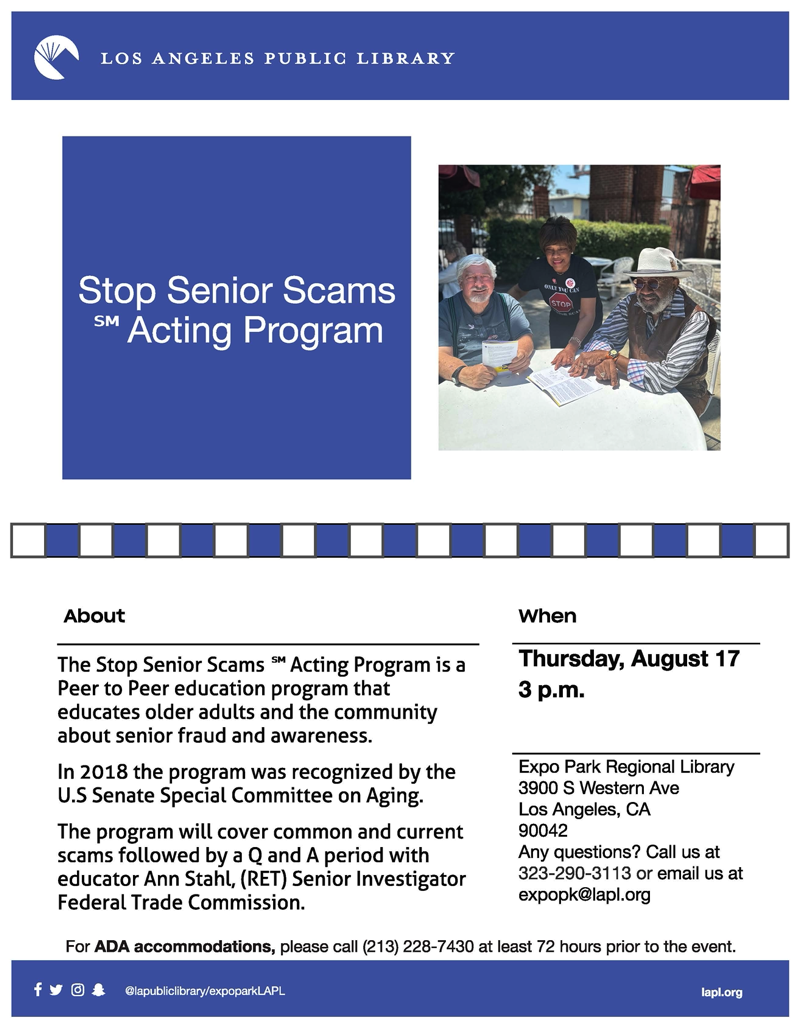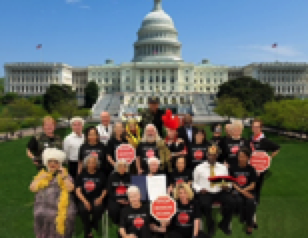
31 Jul SKIMMING AND CREDIT UNION IMPOSTER SCAMS

Dr. Sherry McCoy PhD
is a freelance writer & actor for the Stop Senior Scams Acting Program (SSSAP) in Los Angeles. Follow SSSAP on Facebook . For more info re: SSSAP, contact Adrienne Omansky at SSSAP4U@gmail.com. Questions for the writer should be directed to “Dear Sherry” at Not Born Yesterday! P.O. Box 722, Brea, CA 92822 or nbynews@juno.com.
SKIMMING AND CREDIT UNION IMPOSTER SCAMS
Dr. Sherry McCoy, PhD – Stop Senior Scams ℠ Acting Program
Well, August 2023 has arrived, and with it some pretty hot weather! Most of us are doing our best to stay cool in the summer heat. So, grab a glass of ice-cold lemonade or iced tea – or, my favorite, an “Arnold Palmer” – and settle in while we take a look at a couple of fraudulent schemes that seem to be on the rise these days: skimming scams, and credit union (or bank) imposter scams. My friend, Sally (not her real name), was recently the victim of a skimming and credit union imposter scam. She has agreed to allow me to share her story with readers of this column, in the hope that her story will act as a kind of “wake-up call” and help others to steer clear of these devastatingly fraudulent schemes. You can read Sally’s Scam Story below, but first let’s define a few terms.
SKIMMING — If you’re wondering what “skimming” is, here’s what the FBI has to say about it* —
“Skimming occurs when devices illegally installed on ATMs, point-of-sale (POS) terminals, or fuel pumps capture data or record cardholders’ PINs. Criminals use the data to create fake debit or credit cards and then steal from victims’ accounts. It is estimated that skimming costs financial institutions and consumers more than $1 billion each year.”
That’s a fairly chilling statistic – especially when you realize that the vast majority of scams are not reported to authorities. This means that the amount of money lost to this type of criminal activity is likely much, much larger. It also means that the likelihood is great that many more people will have been victims of this type of fraud. Suffice it to say, skimming is “big business” in the criminal world. (For detailed information on how to protect yourself from Skimming Scams, see the FBI article *“How We Can Help You — Skimming” under REFERENCES below.)
CREDIT UNION (OR BANK) IMPOSTER SCAMS — A credit union or bank imposter scam is when fraudsters — posing as someone from the “fraud unit” of your credit union or bank — contact you with the false claim that there is some suspicious or fraudulent activity on your account. The scammers may ask a lot of questions, saying they need to verify certain personal information so that no further fraudulent activity can occur. This is a lie. What they are really trying to do is gather more personal ID info so they can make additional fraudulent purchases using your account info — or — clean out all the money in your account via wire transfer. When it comes to credit union / bank imposter scams, scammers may contact you via text, email, or by phone. However, on June 8, 2023, an FTC press release** noted that “bank impersonation” was the most-reported text message scam.
If you get an unsolicited text, email or phone call from someone claiming to be from the fraud unit of your bank or credit union, do not engage. Just hang up! Then immediately contact your credit union or bank via the phone number on the back of your debit card and inquire if there is suspicious or fraudulent activity on your account.
SALLY’S SCAM STORY — Earlier this month, Sally, a senior who lives in the greater Los Angeles area, was the victim of a credit union imposter scam. Sally thinks the scammers may have originally obtained some of her personal info regarding her credit union account when she bought gas with a debit card at the pump of a local gas station where she goes regularly. Although she does not know for sure, Sally speculates that a skimmer may have been installed at the gas station pump she used. Shortly thereafter, Sally received a phone call from someone claiming to be from the fraud unit of her credit union, letting her know there had been some suspicious activity on her account. Sally said the caller was very professional in his demeanor and had a lot of information about her account. Sally said “He sounded legit, and this drew me in.” The caller began asking Sally a number of different questions about her account, saying he wanted to make sure no further illegal activity occurred. However, as time went on, Sally became suspicious. She said, “He was asking too many questions, and it was taking too long, so I told him, ‘You’re making me very uncomfortable.’” Sally hung up and called her credit union directly to talk about what, if any, fraudulent activity was on her account.
The credit union told Sally there were approximately 8 transactions, ranging from “buying a hot dog on a stick”, to purchases of $100 or $200 each, all made in a short period of time, none of which were made by Sally. Some purchases were made in the Fresno area, and Sally had not been to Fresno. However, Sally was traveling in Northern California when these bogus purchases occurred. Since she was away from home, she did not monitor her credit union account closely as she would have done were she at home.
Sally had to shut down her credit union accounts, get all new cards, checks, etc. She also had to change passwords on all accounts and all accounts with organizations where she does business. She said the people at her credit union were very helpful in this process, and she very much appreciated their thoughtfulness and kindness.
After Sally shut down her accounts, she also learned from her credit union that someone posing as her had asked to transfer over $40,000 from her debit card account via wire to another account. The credit union informed that person that in order to make a wire transfer for that amount of money, there needed to be a face-to-face interview. So, no money was transferred from Sally’s account. — A close call averted due to the diligence of Sally’s credit union!
Upon hearing this, Sally said she realized that “Our banking systems are doing everything they can to stop fraud and theft.” Additionally, Sally said she is now aware of how important it is that “we as consumers take responsibility for upping our awareness and taking a more active role in monitoring and managing our financial accounts.”
PROTECT YOURSELF – Remember to “Take 5 / Tell 2” — Before you respond to an alarming (unsolicited) text message, email, or phone call — 1) Take 5 minutes to chill out / take some deep breaths; and then 2) Tell 2 people about what happened. This strategy will help you “Get out from under the ether” of a scammer’s intent to trick you into believing their lies are truth. When we’re in a state of panic, we are not thinking clearly and tend to make poor choices. Taking 5 minutes to chill and speak with at least 2 other people about the matter can help get us back on track, so we can reasonably assess the situation and act from a place of reason, not fear.
Be Empowered. Find Your Voice. Speak Out About Fraud!
WHERE TO REPORT SCAMS
Federal Trade Commission at 877-382-4357 or online at https://www.ftccomplaintassistant.gov/#crnt&panel1-1.
For questions about Medicare fraud / abuse: In California, contact Senior Medicare Patrol (SMP) at 1-855-613-7080.
U.S. Senate Special Committee on Aging’s Fraud Hotline at 1-855-303-9470.
REFERENCES
*”How We Can Help You – Skimming,” FBI, https://www.fbi.gov/how-we-can-help-you/safety-resources/scams-and-safety/common-scams-and-crimes/skimming#:~:text=Skimming%20occurs%20when%20devices%20illegally,then%20steal%20from%20victims’%20accounts
**New FTC Data Analysis Shows Bank Impersonation is Most-Reported Text Message Scam, FTC, June 8, 2023,

UPCOMING SSSAP EVENTS
On August 17th, at 2:PM, Exposition Park – Dr. Mary McLeod Bethune Regional Branch Library, 3900 S. Western Ave., L.A 90062. Contact: Eugene Owens, Librarian, at 323-290-3113, for information.
Remember: You may be a target, but you don’t have to be a victim!
Dr. Sherry McCoy, PhD is a freelance writer & actor for the Stop Senior Scams ℠ Acting Program (SSSAP) in Los Angeles. Follow SSSAP on Facebook at https://www.facebook.com/SSSAP2016/?fref=ts. For more info re: SSSAP, contact Adrienne Omansky at SSSAP4U@gmail.com. Questions for the writer should be directed to “Dear Sherry” at Not Born Yesterday! P.O. Box 722, Brea, CA 92822 or nbynews@juno.com.




Sorry, the comment form is closed at this time.